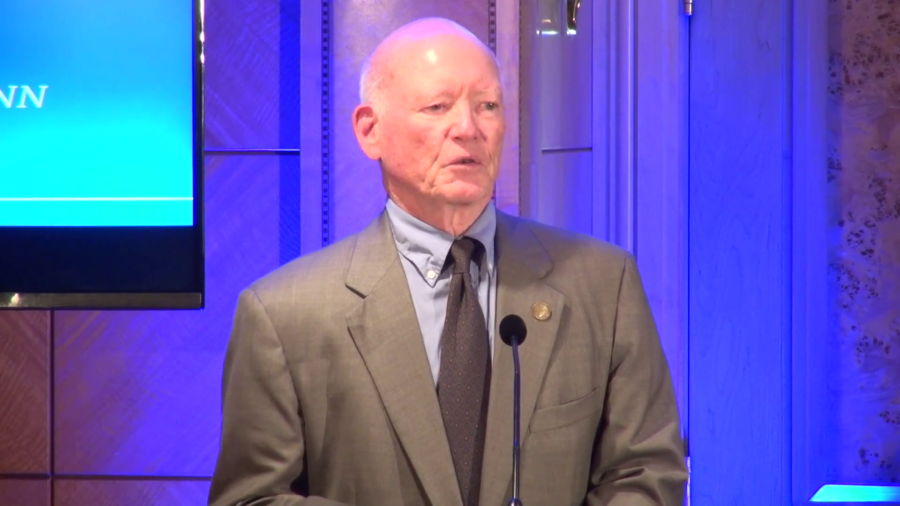Michael Roberts: Thank you. Like others I’m very honored to be here. It’s a distinguished group. I had no expectation of joining you. So it’s a great pleasure to be here and I thank the Internet Society and I think my nominators, and express my appreciation for that.
My love affair with computing, which became after awhile a love affair with networking, began in the middle 60s when I was a graduate student in business at Stanford. And someone said, “You know, there’s something going on on the west side of campus having to do with computers.”
And so I wandered over there and sort of poked around and there was an IBM 7090 and a Burroughs B5500 and somebody said, “You know, you ought to take a programming course. It might be useful.”
Well it was certainly interesting, I’m not sure how useful it was. But those were heady days. Fortran, John Bacchus was at the Almaden lab which was just down the road. And so there was sort of something in the air about it that together— When I became subsequently involved with computing at Stanford, it just has carried forward and Stanford’s leading position in computing continues to this day and is based on an awful lot of talent, and awful lot of energy still. I certainly owe a lot to the many people I worked with at Stanford.
One of the skill sets that I have brought to my career is an appreciation for team-building, which is also in the academic environment called collaboration. And interestingly enough, and I don’t say this in any negative fashion. But if you analyze a little bit about where did this “multistakeholder” term came from, you won’t find any of it in the early days of ICANN. When the initial board and I put ICANN together and we had a set of bylaws and we set off to chase our technical coordination mission, nobody talked about multistakeholders. In fact we talked about support organizations and other sorta code words for trying to get people to pull together, was basically what it was all about.
So, really if you parse multistakeholderism you can find a trail back to academic collaboration and many [indistinct]. I need to be brief because everybody has to have a chance to talk tonight. And many of you have already touched on important themes in your careers that are also important in my career.
One of the things I’d like to close with is to point out that many of us who go back awhile in the Internet have viewed our role as a nurturing role. There are quite a number of people in this room that have played very prominent roles in nurturing the evolution, growth, and development of the Internet. What’s going on right now I think is that we need to recognize that we’re moving out of an era of nurturing. And I don’t want to be dismissive at all of the enormous value of the efforts, the grassroots efforts, that are being made around the world that are still in a nurturing stage.
But for those of us who are still working in and dealing with the really major challenges about the future of of the Internet, we have to recognize that we’re moving into an era of sustaining. Sustaining the Internet. And that requires that we look a little bit down inside ourselves and ask a question about well how did we get here? And that of course I could talk all evening and many of you could as well. But let me suggest to you that the values that are rampant in this room, the values that got us where we are, still have a utility to serve us in the future as we hand off the stewardship roles that we have had to our successors in leadership.
And some of these things you’ll recognize as coming out of an academic environment and potentially a nonprofit environment. Many people are concerned that the profit motive is ruining the Internet. I think we have to really look at that as it’s different strokes for different folks. We absolutely could not have the Internet we have today without private investment and private enterprise. We couldn’t have the Internet we have today without the open and free Internet that we incubated on university campuses. We have to have both.
But to go back very briefly to the notion of values. I’ve always thought as I get into the ending pardon and rather than the beginning part of my career that I’ve been aided by the notion of a respect for learning, and research, and scholarship. Parallel and related to that is the notion of an expectation of intellectual rigor and competence in what we do. The world today has too many people who are taking a free ride on the work of others and somehow or other are getting away with not being very good at what they do. We can’t afford to have any of that in the Internet and in Internet leadership.
Thirdly, we really need the same bias for action that got us where we are. We have Eric telling us he got captured as a graduate student to do sendmail. There are parallel stories in the whole room. So we need to say to ourselves you know, after you’ve covered the learning part and the competence part, go out and use it.
And finally, we have to continue to love what we do, and have fun. Thank you.
